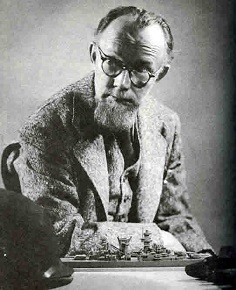De Amerikaanse schrijver en vertaler Murray Fletcher Pratt werd geboren op 25 april 1897 in een reservaat in Buffalo, New York. Pratt, die al na een jaar het Hobart College verliet, werkte aanvankelijk als bibliothecaris, prijsvechter (vlieggewicht) en verslaggever voor de Buffalo Courier Express. Hij vertaalde SF-romans uit het Duits voor Amazing Stories, voordat hij in 1929 begon met het publiceren van zijn eigen verhalen in verschillende pulptijdschriften. In 1926 trouwde hij met Inga Stephens, een kunstenares, die enkele van zijn boeken illustreerde. In de jaren 40 richtte Pratt de club van Trap Door Spiders op, waartoe o.a. Lyon Sprague de Camp en Isaac Asimov behoorden. Asimov vereeuwigde de club in sommige van zijn verhalen, noemde de club in “Black Widowers” en noemde de oprichter Ralph Ottur. Pratt, die eerst korte verhalen schreef en zich uit liefhebberij bezig hield met militaire geschiedenis, publiceerde zijn eerste boek, “The Heroic Years”, in 1934. Dit non-fictieboek gaat over de Napoleontische oorlogen en de Madison Administration in de VS. Pratt, die aan verschillende projecten tegelijkertijd werkte, schreef ook andere non-fictieboeken, waaronder een veelgeprezen werk over de burgeroorlog, de burgeroorlog. In samenwerking met L. Sprague de Camp schreef hij verschillende fantasyromans en verhalen, zoals de humoristische Harold Shea-boeken, die in 1989 opnieuw werden uitgegeven als “The Complete Compleat Enchanter”. “The Well of the Unicorn”, uitgegeven in 1948, is een vervolg op Lord Dunsany’s toneelstuk “King Argimenes en de Unknown Warrior”. Fletcher Pratt schreef ongeveer 50 boeken, zijn laatste, “The Compact History of the United States Navy”, werd twee weken voor zijn dood voltooid.
Uit: The War of the Giants
“It isn’t the heat that gets you, or the noise,” said the man with the scarred chin, licking the end of a cigarette reflectively before applying it to his lips. “It’s the rotten smell. Petrol, hot oil and sweat—yes, and leather. . . . And that isn’t all. You have to keep your mask on when they start, and those new makes smell like rubber and medicine.”
He lit the cigarette and blew a snort of smoke through his nostrils. “Last time I was that sick when I got out I couldn’t even take a nip of whiskey.”
“Mmmm,” murmured the short man with the bald forehead. “And I get seasick every time I go rowing on the lake.”
The man with the scarred chin looked at him sharply. “You better not be seasick. The old man’s nuts on you late draft men that lay down. What were you in before?”
“Aviation. I was on motor repair. I got a wife and three kids, so they gave me selected duty. I’m a motor man.”
“Well, I’m married too. . . . ” the man with the scarred chin thought for a moment. “You must be on the right forward motor. Last man on that job was killed quick as a wink. Shell from one of those robot guns came through the casemate and burst right under the motor. Drove one of those levers clean through him. There’s the place.”
He half-turned and waved in the general direction of the tank that stood like some questing monster in metal, snout lifted to sniff the air, a few yards away. Half way down the hundred-foot flank of the beast workmen were busy painting a new and shining steel plate that had been welded in just below a projecting broadside gun.
Above their heads two more guns projected from shielded casemates, while higher still a big gun in a turret atop threw a long shadow across their work. But if the man with the scarred chin expected his companion to exhibit any sigh of nervousness at the remarks of his predecessor’s passing, he was disappointed. The small man merely gazed with a languid lack of curiosity.”

Fletcher Pratt (25 april 1897 – 10 juni 1956)
